|
|
|
Sort Order |
|
|
|
Items / Page
|
|
|
|
|
|
|
| Srl | Item |
| 1 |
ID:
152269


|
|
|
|
|
| Summary/Abstract |
Due to an abrupt change in legal adjudication, Korean companies might experience a significant rise in wage costs unless preemptive policy measures reduce the legal uncertainty in a coordinated manner. The situation in Korea is compared to that of Japan, with a similar statutory structure for employee wages and allowances.
|
|
|
|
|
|
|
|
|
|
|
|
|
|
|
|
| 2 |
ID:
112732
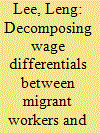

|
|
|
|
|
| Publication |
2012.
|
| Summary/Abstract |
This paper looks at wage discrimination faced by China's rural-urban migrants. Using data from the China Urban Labour Survey, it uses standard wage decomposition techniques to measure the extent wage gaps between migrants and locals are attributable to migration. Because the survey covers five cities, the results allow for an investigation regarding how much variation in discrimination there is. Unlike previous studies of wage discrimination in China, this research includes a more full measure of remuneration by including non-financial benefits as well as bonuses earned. The results suggest that migrants still face a significant amount of discrimination, but that this varies a lot between cities.
|
|
|
|
|
|
|
|
|
|
|
|
|
|
|
|
| 3 |
ID:
159034
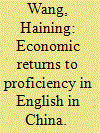

|
|
|
|
|
| Summary/Abstract |
We examine economic returns to proficiency in English in China using two waves of the China Labor-Force Dynamics Survey (CLDS). We find positive earnings returns to proficiency in English. We find considerable heterogeneity in the economic returns to proficiency in English across age groups, coastal and inland provinces, levels of education and occupation. We find that the returns to proficiency in English are higher in the coastal region, higher for women and evidence of education-language and skill-language complementarity. We also see differences in the economic returns to English between urban and rural residents and between rural-urban migrants and urban locals. Our findings help to explain why the demand for learning English is so high in China, as well as having implications for the Chinese government at a time when it is re-evaluating the importance attached to learning English in the curriculum.
|
|
|
|
|
|
|
|
|
|
|
|
|
|
|
|
| 4 |
ID:
105833
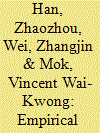

|
|
|
| 5 |
ID:
130974
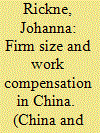

|
|
|
|
|
| Publication |
2014.
|
| Summary/Abstract |
Remarkably, recent research on the Chinese labor market has suggested that the situation in China is inconsistent with the stylized fact that large firms pay higher wages and offer more generous benefits. Expanding the empirical basis from 78 to 300 000 industrial firms, I overturn the previous result and show that wage determination in the average firm fits the international norm. Exploring subsamples of firms I also point to a likely source for the conflicting findings: firm size is positively correlated with the average wage in private firms, but negatively correlated with the average wage in the state-owned sector. These novel results could guide future studies aiming to understand the sources of the firm size wage premium, and, in particular, studies that target the largest industrial labor market in the world.
|
|
|
|
|
|
|
|
|
|
|
|
|
|
|
|
| 6 |
ID:
127181
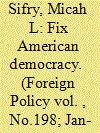

|
|
|
| 7 |
ID:
186214
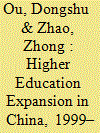

|
|
|
|
|
| Summary/Abstract |
We examine the impact of China's higher education expansion on labor market outcomes for young college graduates using China's 2005 1 Percent Population Sample Survey. Exploiting variations in the expansion of university places across provinces and high school cohorts between 1999 and 2003, we apply a difference-in-differences model and take into account the demand-side effect by using the Bartik index. We find that the expansion of higher education in China decreased unemployment rates among males and college graduates in the short term. However, the policy decreased women's labor force participation and individual earnings in high-skilled white-collar jobs. We further discuss potential channels affecting the outcomes that were observed. Our results illustrate the broad economic benefits of higher education. The findings shed new light on the contribution of young skilled labor in the economic growth of China and call for policies that can alleviate the short-term negative impact of higher education on individual students and maximize human capital. Our study also provides an interesting example of the consequences of the unequal expansion of higher education opportunities on the labor market of an emerging economy.
|
|
|
|
|
|
|
|
|
|
|
|
|
|
|
|
| 8 |
ID:
133652


|
|
|
|
|
| Publication |
2014.
|
| Summary/Abstract |
Proponents often recommend high labor standards as a means of reducing inequality between and within countries. Opponents suggest that labor standards exacerbate international and domestic inequalities. In this paper, we forward a simple argument whereby the impact of higher labor standards on domestic inequality depends on a country's labor endowment. We hypothesize that where labor is abundant, higher standards will exacerbate inequality. Where labor is scarce, higher labor standards might lower inequality. In both cases, the impact of labor standards on inequality work through an employment and wage effect. Using newly available data on labor standards around the world from 1981 to 2000, we provide evidence largely consistent with our hypotheses. Higher labor standards do, indeed, exacerbate inequality in labor-abundant economies. On the other hand, higher labor standards lower inequality in labor-scarce economies. We discuss the implications of these findings for work on labor market insiders and outsiders as well as the political economy of development.
|
|
|
|
|
|
|
|
|
|
|
|
|
|
|
|
| 9 |
ID:
181614
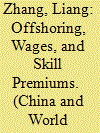

|
|
|
|
|
| Summary/Abstract |
Using detailed Chinese manufacturing firm production and trade data from 2000 to 2006, this study finds that offshoring significantly increases firms’ average wages. First, using the quasi-natural experiment of China's accession to the World Trade Organization, we investigate how a reduction in offshoring costs affects the manufacturing firm's wages and find that a productivity effect and a job-relocation effect are two possible channels. Second, the dynamic decomposition of industry-level wages indicates that the within-firm effect is 0.547, accounting for 31.5 percent of the total variation. Finally, a Mincer-type regression shows that offshoring also increases within-firm skill premiums. Our findings have strong implications for the government related to framing appropriate industrial policies to raise wages and reduce income inequality.
|
|
|
|
|
|
|
|
|
|
|
|
|
|
|
|
| 10 |
ID:
100618
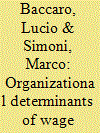

|
|
|
|
|
| Publication |
2010.
|
| Summary/Abstract |
This article contributes to the political economic literature regarding the effects of industrial relations institutions on national economic outcomes. Based on an econometric analysis of the determinants of wage moderation in sixteen industrialized countries between 1974 and 2000, it argues that the organizational characteristics of trade unions have a significant impact on wage dynamics. Controlling for a number of institutional and economic factors, the countries in which trade union confederations directly involve workers in the process of collective bargaining ratification have on average lower wage growth relative to productivity than others. The authors also find that collective bargaining coordination and contract ratification magnify each other's wage-dampening effect. Through case studies of Ireland and Italy, the article examines the causal mechanisms underlying the uncovered statistical regularities and concludes that, particularly at a time in which classic political exchange is waning, worker involvement in contract ratification allows confederation leaders to resolve conflicting claims inside their organizations at lower wage levels than are achieved by a less participatory governance process.
|
|
|
|
|
|
|
|
|
|
|
|
|
|
|
|
| 11 |
ID:
161810


|
|
|
|
|
| Summary/Abstract |
This study investigates the impact of rising wage and the appreciation of the yuan on the structure of China's exports. China's exports are classified here as ordinary exports (OE), and two distinctive groups of processing exports, pure assembly exports (PAE) and mixed assembly exports (MAE). The data analyzed here are derived from panel data covering China's bilateral PAE and MAE with 120 trading partners from 1993 to 2013. The estimates of fixed effect models show that wage increase and the appreciation of the yuan reduced the proportion of assembly exports in China's bilateral exports. Specifically, for a 10% increase in Chinese manufacturing wages, the share of PAE in China's bilateral exports is expected to fall 4.59% and that of MAE to decrease 0.9%; and a 10% nominal appreciation of the yuan against the US dollar is expected to lower the shares of PAE and MAE 8.56% and 7.26% respectively. The empirical results imply that rising wage and cumulative appreciation of the yuan have eroded China's comparative advantage in the assembly of products for international markets, resulting in substantial contraction of assembly exports. The analysis provides a supply-side explanation for the fall of China's export growth.
|
|
|
|
|
|
|
|
|
|
|
|
|
|
|
|
| 12 |
ID:
103784
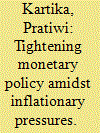

|
|
|
| 13 |
ID:
183775


|
|
|
|
|
| Summary/Abstract |
While the firm-level distributional consequences of market liberalization are well understood, previous studies have paid only limited attention to how variations in domestic institutions across countries affect the winners and losers from opening up to trade. We argue that the presence of coordinated wage-bargaining institutions, which impose a ceiling on wage increases, and state-subsidized vocational training, which creates a large supply of highly skilled workers, generate labor market frictions. Upward wage rigidity, in particular, helps smaller firms weather the rising competition and increasing labor costs triggered by trade liberalization. We test this hypothesis using a firm-level data set of European Union countries, which includes more than 800,000 manufacturing firms between 2003 and 2014. We find that, for productive firms, gains from trade are 20 percent larger in countries with liberal market economies than they are in coordinated market economies. Symmetrically, less productive firms in coordinated market economies experience significantly smaller revenue losses compared to liberal market economies. We show that both the presence of an institutionalized wage ceiling and the availability of subsidized vocational training are key mechanisms for reducing the reallocation of revenue from unproductive to productive firms in coordinated market economies compared to liberal market economies. In line with our theory, we find that wages and employment in liberalized industries increase differentially across both types of labor markets. Finally, we provide suggestive evidence that trade liberalization triggers a differential demand for redistribution at the individual level across different labor markets, which is in line with our firm-level analysis.
|
|
|
|
|
|
|
|
|
|
|
|
|
|
|
|
| 14 |
ID:
147407
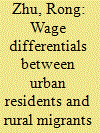

|
|
|
|
|
| Summary/Abstract |
This paper examines the wage differentials between urban workers and rural migrants in China's urban labor market. The wage differentials between the two groups are found to be higher at the top end than at the bottom part of the wage distribution in both 2002 and 2007. We decompose the distributional wage differentials between the two groups into a composition effect explained by differences in productivity characteristics, and a discrimination effect attributable to unequal returns to those characteristics. We find that the discrimination against migrant workers increases with the percentile of wage distribution in both 2002 and 2007. We also show that the discrimination against rural migrants has intensified during 2002–2007 throughout the wage distribution.
|
|
|
|
|
|
|
|
|
|
|
|
|
|
|
|
| 15 |
ID:
043804
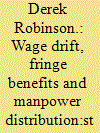

|
|
|
|
|
| Publication |
Paris, DECD, 1968.
|
| Description |
180p
|
|
|
|
|
|
|
|
|
|
|
|
Copies: C:1/I:0,R:0,Q:0
Circulation
| Accession# | Call# | Current Location | Status | Policy | Location |
| 006264 | 331.21/ROB 006264 | Main | On Shelf | General | |
|
|
|
|
| 16 |
ID:
159767
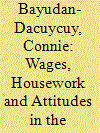

|
|
|
|
|
| Summary/Abstract |
This paper is one of the few studies that systematically analyzes housework in the Philippines. It seeks to understand how wages and attitudes to work and family life affect the time devoted to housework. Based on different specifications and estimators, our findings indicate that respondents’ own wages are not a significant predictor of the hours they spend on housework but that they are a significant predictor of the time spouses devote to non-market production. We find that husbands’ housework hours are positively affected by female respondents’ wages, while wives’ housework hours are negatively affected by male respondents’ wages. We turn to the Philippine context to explain these results and find the combination of egalitarian society and gender inequality in the labor market to be plausible explanations. Results also show that both wages and attitudes have direct effects on wives’ housework time but that some of the effects of wages are mediated by respondents’ attitudes toward gender roles.
|
|
|
|
|
|
|
|
|
|
|
|
|
|
|
|
| 17 |
ID:
128797


|
|
|
|
|
| Publication |
2013-14.
|
| Summary/Abstract |
Has the emergence of global financial markets brought with it global financial warfare? This article discusses the canon of financial warfare and how one might wage it across both the strategic and tactical realms.
|
|
|
|
|
|
|
|
|
|
|
|
|
|
|
|
| 18 |
ID:
108323
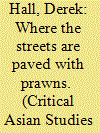

|
|
|
|
|
| Publication |
2011.
|
| Summary/Abstract |
As the proportion of the gross domestic product of Southeast Asian countries accounted for by agriculture continues its long-term decline, it is natural in studying regional migration flows to emphasize the ways people are moving away from farming. Across the region, however, millions of people continue to migrate both within and across international borders to take part in agricultural production. Many of them are moving to grow "boom crops" like cocoa, coffee, oil palm, rubber, and shrimp, all of which have seen rapid expansion over the last two decades. In this article, the author provides a comparative survey of the links between crop booms and migration in Southeast Asia, arguing that this migration has taken three main forms: relatively autonomous and "spontaneous" migration by households or individuals looking to set up as boom crop-growing smallholders; a "transmigration" model in which parastatal agencies or private corporations with state support help migrants to relocate so that they can take part in organized farming schemes with at least some smallholder component; and migration for the purpose of working as waged laborers for plantations or richer smallholders growing boom crops. The importance of these types of migration has varied across crops. In the conclusion, the author makes several points about the politics of migration and crop booms.
|
|
|
|
|
|
|
|
|
|
|
|
|
|
|
|
| 19 |
ID:
182581
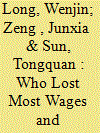

|
|
|
|
|
| Summary/Abstract |
China managed to eliminate all extreme poverty in rural areas in 2020. Poor households, however, may risk falling back into poverty due to the COVID-19. This paper examines the impacts of the pandemic on wages and household incomes among different groups in poor areas of rural China. Using a unique dataset from five poverty-stricken counties, we found that the pandemic has had large negative effects on wage income for migrant workers and workers in manufacturing, the private sector, and small enterprises. Compared with households relying on wage income, households relying on small businesses have suffered much more from the pandemic, whereas households depending on farming or transfer payments have been less affected. Although poor and ethnic minority households lost significant amounts of wage income due to the pandemic, they did not lose more household income than nonpoor and nonminority households. We conclude that support from the government has kept vulnerable households from suffering more than other households from the effects of COVID-19. Our findings suggest that the government can play a strong role in alleviating the negative impacts of the COVID-19.
|
|
|
|
|
|
|
|
|
|
|
|
|
|
|
|
|
|
|
|
|